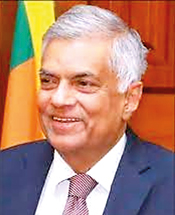Former PM: Make Port City game changer, not gaming centre

Former PM Ranil Wickremesinghe
The Colombo Port City, one of the most significant projects with tremendous potential has to go forward in the right direction as a game changer but not as a betting and gaming centre for money laundering, former Prime Minister Ranil Wickremesinghe emphasised.
In a phone-interview with the Business Times, Mr Wickremesinghe, four times Prime Minister of Sri Lanka with four decades of experience in politics, outlined the past and present developments of the Port City Project and the relevant laws being drafted during his regimes.
He noted that the notable difference between the previous regime’s draft law for the envisaged offshore financial city and the present Port City Economic Commission bill was the inclusion of casinos among off Shore Service and Financial Centres.
The present government has failed to indicate anything about new laws that allow offshore financial services such as banking and insurance, he pointed out.
Under the present circumstances, there was no possibility to attract foreign investors even from the South Asian region especially from India; he said adding that the intention of the present regime may be to raise black money projecting the image of the Port City.
This was clearly indicated in the absence of laws on offshore financial services, removing Port City from the purview of the Finance Ministry and making it independent of Parliament, he explained.
Mr .Wickremesinghe noted that there is a difference between a “Financial City” which was planned by the then government and ‘ Gaming island’ which is being created under the all powerful Commission proposed by the present Rajapaksa regime. This new ‘Commission’ where several monopolies are granted under the single window concept makes it a very powerful entity which will be recognised by the country’s law, he said pointing out what his regime’s plan was to maintain Port City parallel to the country’s development in transport logistics as a part of the hub of the Indian Ocean.
It has been planned by the previous government to gazette the Port city reclaimed land as a new central business and real estate development area under the purview of Colombo divisional secretariat in the Colombo District.
At that time legislation was drafted by a team of legal experts to maintain a regional hub where the government will develop ports, airports, and get financial services and offshore services. “On the other hand, we were looking at a digital economy and a green economy,” he disclosed.
But according to the present bill the Commission will be entrusted with the administration, regulation and control of, all matters connected with businesses and other operations, in and from the area of authority of the Colombo Port City.
Mr. Wickremesinghe said that consultation compromise and consensus on the proposed legislation would be beneficial to ensure the project serves the county’s best interest and attracts the right kind of investments but not black money from money laundering.
He stressed that the legislation needs to be in consistent with the Constitution of the country and that transparency and accountability were key to success.
At the initial stages “we held discussions with with China Harbour Corporation and they were willing to assist us by even handing over a building at the Port City for the proposed International Financial Centre,” he revealed.
“We spoke to the UK, EU and China. We spoke with the Reserve Bank of India and the IMF and the Pakistan, Bangladeshi and Maldives banks and consulted them on off shore financial services. We had a positive response and assistance during our visits to Ireland and UK. We were also drafting a law at that time and that was going to be a framework law. If you were going to introduce any offshore laws it is essential to get Parliamentary approval,” he said.
These laws were aimed at providing provisions for a Special Economic Zone (SEZ) for services; he said adding that there was to be real estate, yacht marinas, retail, world class universities and proper health care etc and it was a 10-12 year long plan.
The Colombo International Financial City (CIFC) legal entity headed by former Attorney General Yuvanjana Wijethilake with a cadre of supporting staff had been working on the Colombo CIFC law at that time and most of the drafting was nearing completion, he revealed.
A reputed UK based law firm was engaged in the evaluation of the draft CIFC Law and the selected British law firm had been involved in drafting detailed rules and regulations of the CIFC in accordance with the common law in consistent with the Constitution, he revealed.
In January 2017, a group of highly reputed international consultants had been engaged in looking at strategy and policy studies with regard to the CIFC.
These consultants included former chairman Merrill Lynch Europe Ltd, the chairman of UK Finance, representatives of 300 leading financial service companies including British Bankers Association, top officials of Dubai International Financial Corporation and the Qatar Financial centre.
They had come with some drafts on the CIFC Law and ways and means to transform the CIFC to a regional hub and set the agenda for the city of the future.
The finance and marina district master plan was designed by SOM (Skidmore Owings & Merrill) for CHEC Port City Colombo to transform 269 hectares of reclaimed land beside Colombo’s central business district.
The financial city was planned to function as a special jurisdiction area directly under the state and accountable to parliament with its own economic and commercial laws compatible for international and British laws and Sri Lankan law to facilitate operations of global multinational corporations and grow as a business and financial hub, he revealed.



